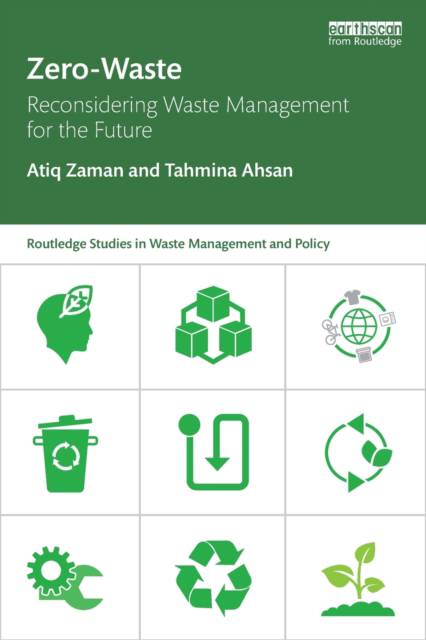
- Retrait gratuit dans votre magasin Club
- 7.000.000 titres dans notre catalogue
- Payer en toute sécurité
- Toujours un magasin près de chez vous
- Retrait gratuit dans votre magasin Club
- 7.000.0000 titres dans notre catalogue
- Payer en toute sécurité
- Toujours un magasin près de chez vous
Description
This book analyses 'zero-waste' (ZW) as an emerging waste management strategy for the future, which considers waste prevention through innovative design and sustainable consumption practices.
Drawing on a diverse range of case studies from Australia, Bangladesh, Japan, New Zealand, Sweden, and the USA, this book explores why urban waste management systems still remain a major challenge for almost all cities around the world. Rejecting waste as an 'end-of-life' problem, Atiq Zaman and Tahmina Ahsan instead consider waste prevention through the ZW model, in which resources are utilized and consumed with minimum environmental degradation. In addition, the authors give extended discussion on why embracing the ZW concept will be beneficial for the circular economy (CE).
Providing a strategic zero-waste framework and an evaluation tool to measure waste management performance aimed towards ZW goals, this book will be of great relevance to students, scholars, and policymakers with an interest in waste management, sustainable consumption, urban planning, and sustainable development.
Spécifications
Parties prenantes
- Auteur(s) :
- Editeur:
Contenu
- Nombre de pages :
- 216
- Langue:
- Anglais
- Collection :
Caractéristiques
- EAN:
- 9781138219090
- Date de parution :
- 03-12-19
- Format:
- Livre broché
- Format numérique:
- Trade paperback (VS)
- Dimensions :
- 155 mm x 231 mm
- Poids :
- 399 g

Les avis
Nous publions uniquement les avis qui respectent les conditions requises. Consultez nos conditions pour les avis.






